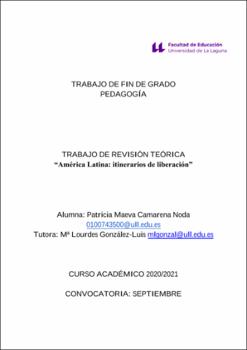América Latina: Itinerarios de liberación.
Fecha
2021Resumen
Este Trabajo de Fin de Grado se presenta como un viaje pedagógico por América Latina,
en él podremos observar que el aprendizaje debe estar ligado al conocimiento y la investigación
de la cultura y los contextos, es por ello que estudiaremos los conceptos de colonización y
colonialidad como uno de los primeros pasos a seguir en esta introducción a un pensamiento
alternativo, para poder comprender los efectos secundarios de la colonización y entender el
proceso de decolonialidad al que se enfrenta Latinoamérica tras su lucha contra la dependencia,
no solo política (conseguida con la descolonización) sino también del saber, del vivir, del sentir
o del pensar.
Para ello será necesario regresar al pasado repasando los antecedentes que preceden al
pensamiento alternativo, crítico y liberador, haciendo especial mención a Simón Rodríguez,
José Carlos Mariátegui y Eugenio Mª de Hostos, ejemplos por excelencia de la descolonización
del pensamiento, la lucha por la emancipación del sujeto y la ruptura con cualquier tipo de
atadura. Tras entender los conceptos de colonialidad y decolonialidad y adentrarnos un poco en
la búsqueda de la independencia del sujeto con las prácticas pedagógicas de los autores
anteriores, nos centraremos en analizar a Paulo Freire y su importancia en la pedagogía de la
libertad y la emancipación del S. XX, repasando algunas de sus más destacadas aportaciones.
Por último, haremos un breve recorrido por las epistemologías del sur, de la mano de su
creador, Boaventura de Sousa Santos, quién introduce este concepto como una metáfora del
sufrimiento humano causado por las formas de opresión (capitalismo, patriarcado y
colonialismo) y la lucha y resistencia de estas formas de opresión. This Final Degree Project is presented as a pedagogical trip through Latin America in
which we will be able to observe that learning must be linked to the knowledge and research of
culture and contexts, that is why we will study the concepts of colonization and coloniality as
one of the first steps to follow in this introduction to alternative thinking, to understand the
secondary effects of colonization and understand the process of decoloniality that Latin
3
America faces after its struggle for dependency, not only politics (achieved with
decolonization) but also knowledge, living, feeling or thinking.
It will be necessary to return to the past by reviewing the antecedents that precede
alternative, critical and liberating thinking, making special mention of Simón Rodríguez, José
Carlos Mariátegui and Eugenio Mª de Hostos, examples par excellence of the decolonization
of thought, the struggle for the emancipation of the subject and the break with any type of
dependency. After understanding the concepts of coloniality and decoloniality and delving a
little into the search for the independence of the subject with the pedagogical practices of the
previous authors, we will focus on analyzing Paulo Freire and his importance in the pedagogy
of freedom and emancipation of the s.XX, reviewing some of the most outstanding pedagogical
learnings of him.
Finally, we will take a brief tour of the epistemologies of the south, by the hand of its
creator, Boaventura de Sousa Santos, who introduces this concept as a metaphor for human
suffering caused by forms of oppression (capitalism, patriarchy and colonialism) and the
struggle and resistance of these forms of oppression.





